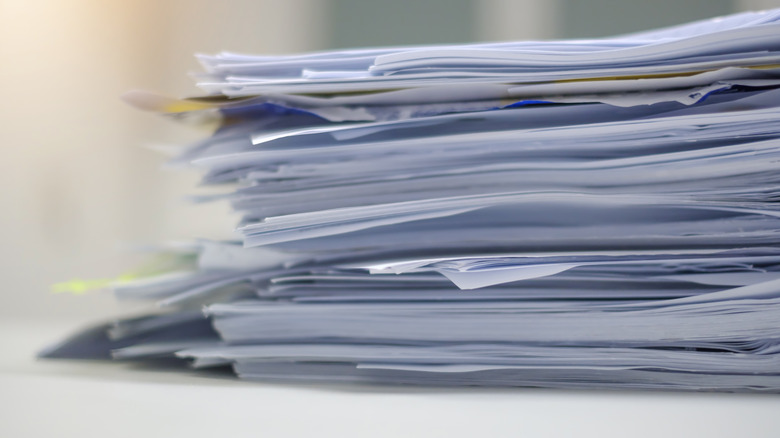How To Manage And Organize All Of Your Important Documents
Trying to manage clutter while maintaining a busy schedule can be difficult. While all types of clutter can quickly become unsightly and take up valuable space in your home, paper jumble, and clutter in the form of documents, can perhaps accumulate the quickest. Ellen Delap, president of the National Association of Productivity and Organizing Professionals, shared via Real Simple that documents and mail clutter are the main reason clients reach out to request her organizing expertise. Per Cision PR Newswire, a survey conducted by DeCluttr and the National Association for Professional Organizers discovered that 54% of Americans feel overwhelmed by clutter while 78% have no idea what to do with it or how to tackle it, so they simply let it accumulate.
Mail and document jumble can be particularly tricky to handle, and unlike many of the other items that you have been holding onto that are cluttering and taking up space in your home, you can't just sell it in the garage sale or donate it to Goodwill. As frustrating as it might be to watch the infamous mail pile on your counter grow larger and larger, the reality is that most of the documents in that pile, such as bills, tax records, health documents, and more, are important and should be saved. Though clutter is an inevitable part of life, it's possible to keep and maintain your essential documents in an organized way that doesn't add to them.
Sort through your existing documents
Before you can organize or put away your important documents in the right way, you first need to purge the papers you know that you for sure do not need. While organizing your documents is ultimately the goal, including papers you have no use for in your new organization system simply continues to allow those papers to unnecessarily take up valuable space in your home.
If your documents have taken over the entirety of your kitchen counter and you aren't sure where to begin, the Document Advantage Corporation suggests breaking down more enormous piles of paper and sorting them into smaller, more manageable groups that can be easily organized. Working through those smaller piles allows you to see your results faster, creating a sense of accomplishment and inspiring you to keep going. They also recommend scheduling time to sort through your documents since you will be less likely to be distracted or interrupted if you intentionally carve some time out of your schedule to tackle the project.
Categorize each document
While going through your initial paper piles, The Spruce recommends sorting the documents into five distinct categories: action, archive, household, recycle, and shred. Papers that belong in the action pile would be anything that needs immediate attention and can then be recycled, such as bills, wedding or party invitations, appointment reminders, or parking tickets. Once you are confident that they have been addressed, you no longer have a need for them, and they can then be recycled or shredded.
Documents that belong in the archive category should be things like tax records, leases, warranties, or anything else that needs to be kept but that doesn't need to be referenced any more often than once or twice a year. The household pile should contain documents you reference and utilize more often, such as recipes, coupons, user manuals, and upcoming travel documents.
Getting rid of papers during a decluttering spree can free up valuable space on your kitchen counter and make you feel lighter. However, you should still exercise care, even when it comes to the documents you no longer need or want, in case they contain any personal information. Any paper that does not have personal or confidential information can be safely recycled. In contrast, more personal documents with identifying information on it should be shredded before being discarded to protect your private information.
File and store each category
The archive pile will likely contain a lot of your most valuable information, so it's imperative to make sure you store these documents in a secure location, such as a fireproof safe or lock box to protect them, according to The Spruce. If you have a lot of documents that need to be archived, they suggest sorting those papers into even smaller subcategories and having a designated spot for all records related to broader categories such as real estate documents, academic records, health records, insurance information, et cetera. This way, they can be easily referenced when needed, and due to the organization style, they won't disrupt and disorganize the other documents.
Similarly, you can organize the documents in the household pile by sorting them into smaller categories that best suit your lifestyle. And while it would be acceptable to keep your household documents in a filing cabinet, The Spruce recommends keeping them in a binder instead, as it takes up less room and can be easily stored and moved as needed.
You want to keep your action pile as small as possible, and because of that, you shouldn't ever fully store or put away any of your documents from that pile since they need to be immediately addressed. The best option is to keep them in a desktop paper tray or a single, easily accessible file folder — allowing your documents to be organized while still being instantly on-hand.



